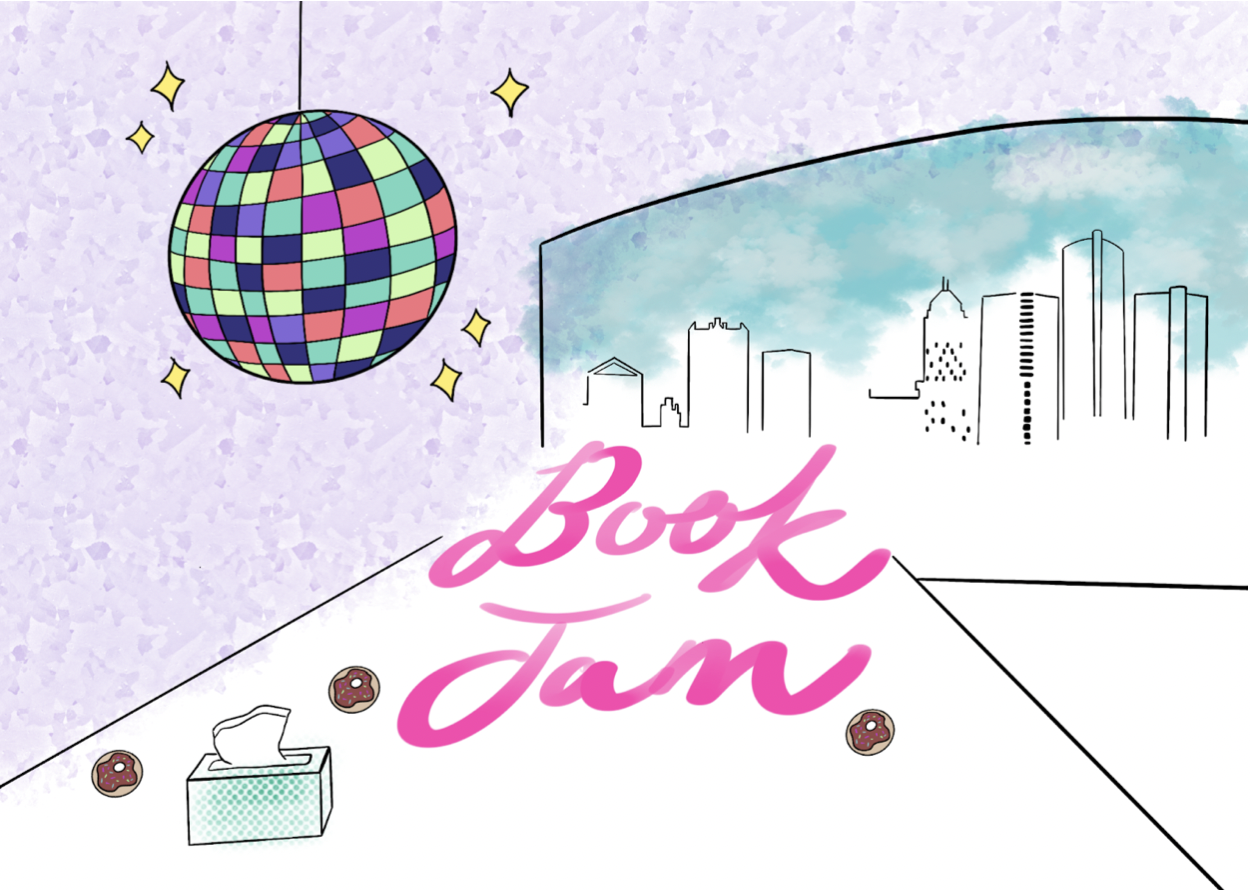Five Days of Collaborative Writing
by Jessica Hill Riggs
Image description: ‘Book Jam’ in pink cursive handwriting in the middle of long white conference table. The conference table meets the Detroit skyline where there’s a huge window. On the table is a aqua Kleenex box and chocolate sprinkle donuts. Hanging above is a multicolored disco ball.
What does it mean to engage in a collaborative writing project? Particularly, when so many academics are trained to write alone? We imagine writers and researchers camped out in offices, libraries, or coffee shops, lost in their thoughts, scribbling on notepads, or clacking away at their computers for hours. Writing and editing can be an inherently difficult and solitary process, but writing does not need to be so lonely.
The DISCO Network gathered at the Element Hotel in Detroit, Michigan from June 19-25, 2022 for our first “Book Jam” or our first collaborative writing project. Through the expertise and support of BookSprints, a rapid book production company that operates worldwide, we met for an intense five-day writing retreat. Our goal was to have a short book, accessible to many audiences, written and edited by the end of day five. #WritingGoals
Although we had been meeting virtually for over a year as a research initiative and a network, this was the first time that all our co-principal investigators and staff were able to meet or gather in person due to COVID-19.
The BookSprints method is composed of a sprint-style or rapid production writing process. We entered our Book Jam with a key understanding of the themes we wanted to write about–issues of race, gender, disability, and technology–but without a single page written, which is intentional on behalf of the BookSprints process.
On the first day of the workshop, our facilitator, Faith Bosworth, guided us through conversations about what brought us to this space. What brought us to the digital? Who were we writing for? During a tumultuous time, what needs to be said about the digital that hasn’t been said yet? How can we be innovative with format? How can we acknowledge all the labor and resources that go into organizing and hosting an event of this kind?
Through a process involving countless conversations, post-in notes, lots of donuts, coffee, and barks of support from a Shih Tzu puppy named Loki, we were able to narrow down our themes–love, empathy, content creation, and the mundane in the digital world. Our next several days included breaking our group down into writing partners, writing on our selected themes within these writing pairings, and then swapping sections to be edited by the rest of our team. While we slept in our hotel beds at night, BookSprints copy editors based in New Zealand and South Africa read, edited, shared notes, and provided feedback on our drafts.
It’s important to acknowledge that writing can be an extremely emotional process. When you gather 11 people in a room to write on a variety of topics–some personal and some not, some within and outside of academic comfort zones–the process becomes even more personal and sometimes tricky to navigate. Strong opinions bubbled up to the surface, but one must be willing to forgo an idea for the sake of the collective vision and outcome of the project. One must be willing to write or edit on ideas that they are not experts on. Even if the group is supportive of an idea and vision, does the group have the bandwidth and capacity to carry out the vision?
Given our research initiative’s focus on disability and conversations on crip time and access, parts of the retreat’s setup and format pushed against our core DISCO Network values. How can we hold the space for a rapid collaborative writing process without exhausting our body-minds? It was a challenge to hold in balance.
Although this week was frustrating and exhausting at times, collaborative writing can also be extremely rewarding. Our team is comprised of thinkers coming from a wide variety of disciplines who bring different life experiences and questions regarding race, gender, disability, and technology. The group's ability to ping-pong ideas off each other was inspiring; our ideas were stronger when in conversation together. Collaborative writing, when done intentionally, can be enriching and rewarding.
Given the “O” in DISCO, which stands for optimism, we’re leaving Detroit this week with a monograph that we hope leaves readers with some perspective, a little bit of joy, and more optimism regarding our collective digital futures.
